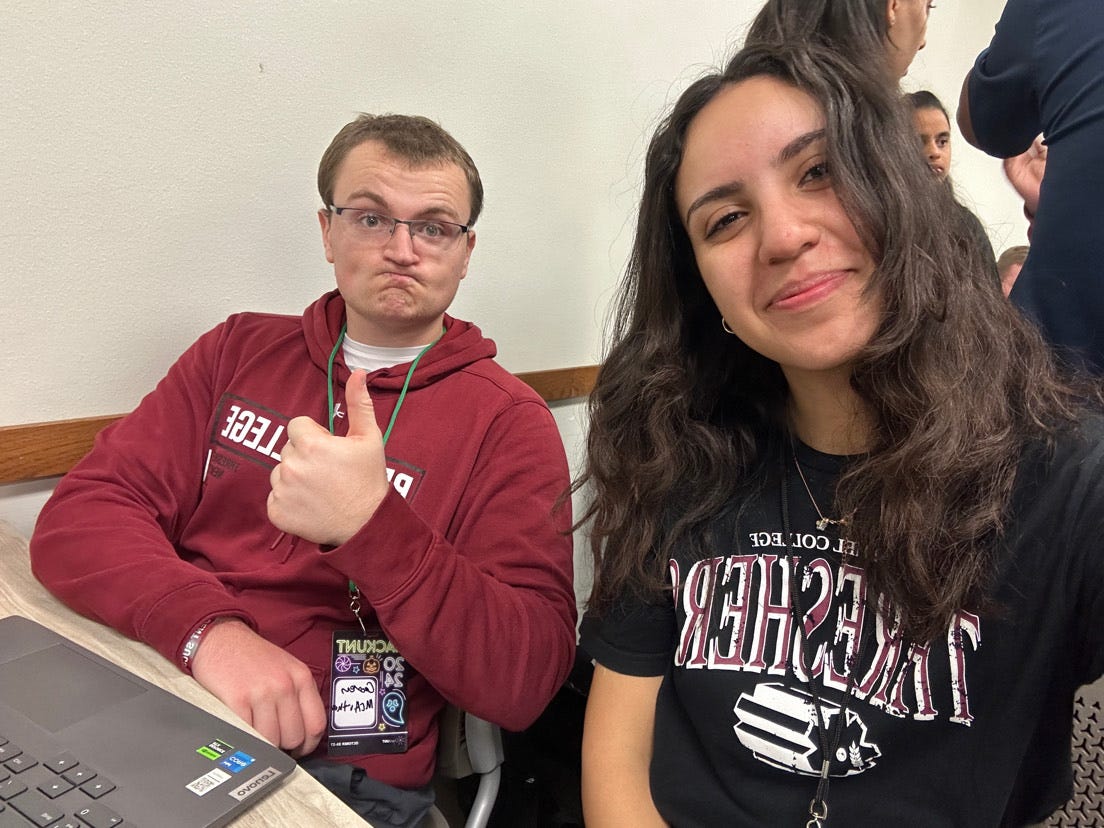Coding the future: Bethel College students excel at hackathons
Caden McArthur and Meriem Dhouibi reflect on their recent participation in hackathons.
Recently, Bethel College has begun expanding its presence in the sphere of software development. One of its largest expansions was the establishment of the Software Development Club, founded by Caden McArthur, a senior from Cleveland, Okla. McArthur, along with fellow club member Meriem Dhouibi, a freshman from Tunis, Tunisia, are among the first Bethel students to attend hackathons.
A hackathon, as McArthur describes, is an intense 24- to 48-hour event where programmers and tech enthusiasts compete to create standout software. Participants are given themed challenges and must collaborate to develop creative, functional projects within the time limit.
McArthur and Dhouibi and other members of Bethel’s Software Development Club have attended hackathons hosted by institutions such as the University of Kansas (KU), the University of North Texas (UNT), Kansas State University (K-State), as well as a hackathon held by NASA called the NASA Space Apps Challenge. When the duo competed in the Space Apps Challenge, they won the People’s Choice and Local Impact awards for creating an interactive map of the solar system.
According to the duo, Hackathons are not for the faint of heart. McArthur shared that the UNT hackathon was particularly difficult. “We had to get up and drive five hours the day before. I was just tired the whole time.”
Despite the exhaustion, he described the experience as not only fun but invaluable for the growth of his skill sets. Dhouibi echoed how overwhelming these endurance events can be when she said, “It’s so draining. These hackathons are really fun, and you learn so much, but it takes so much from you.”
When describing the atmosphere of the events, Dhouibi said, “It's so unique. Because all these people are dedicating 36 hours of their lives to just sit and code.” This collaborative environment inspired Dhouibi to continue exploring computer science despite her initial hesitations.
For McArthur, the most rewarding part came when his projects started to “click.” He reflected, “Man, this is actually cool, because I’m building stuff that’s gonna be put on my resume.”
The duo agreed that one of the most significant benefits of competing at a hackathon is the chance to network within the industry. Dhouibi highlighted the peer connections, noting that “Hackathons show you there’s this sense of community, and you connect.” She further emphasized that these events, “give you such a nice gateway to a world of all these people who really want to help you get jobs.”
McArthur agreed, mentioning the corporate sponsors who attend these events: “There are corporate sponsors there as well who want people to make things related to their industry.” He pointed out that companies often genuinely engage with competitors when he said, “They want people to apply to work there, So it’s not like they’re just there to promote their company; they are genuinely interested in you.”
Both students agreed that the trial-by-fire structure of these events builds practical skills. Dhouibi stressed the importance of planning and knowing one’s skills when she says, “Your idea can be the most innovative, the most insane, whatever, but if you don’t know how to execute it, it’s pointless. But you can have this really basic idea, and if you know how to solve it, the judges will love it.”
“Your idea can be the most innovative, the most insane, whatever, but if you don’t know how to execute it, it’s pointless. But you can have this really basic idea, and if you know how to solve it, the judges will love it.”
Meriem Dhouibi
Similarly, McArthur emphasized the importance of hands-on experience when he said, “There’s only so much that professors can teach you. They teach you the basics, but developing an entire program is an entirely different deal.”
To succeed in future hackathons and foster skills in their future careers, both students plan to refine their preparation strategies. McArthur advises, “Build a couple of projects with technologies that you feel like you can learn and you feel accustomed to,” mentioning that being comfortable with one’s skill set is key to success in an industry where people need to have solutions to problems that spring up with little notice.
Dhouibi emphasizes how important it is to ask for help when she recounted, “I was stuck, scared to ask [McArthur], but then, I asked him, and he immediately was like ‘this is it,’ and I got it in like three minutes.”
Beyond refining their technical skills, both students are thinking about the future of software development at Bethel. Dhouibi said, “There needs to be more emphasis on the importance of pursuing outside projects in computer science.”
McArthur agreed, noting that hackathons and similar events help prospective students stand out in the job market: “Software is just so different from any other industry. You have to have projects and stuff on your resume to prove that you actually build stuff and know how to code.”


